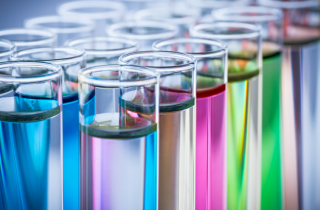Genetics
At a Glance
Cancer cells behave differently than normal, healthy cells and tissues. For a long time, cancer was thought to occur because of mutations in the genes (DNA) in individual cells. Newer understandings suggest that the picture is more complex.
There are three primary ways that genes affect cancer (more detail below):
- Inherited genes: Some genes can predispose individuals to cancer by affecting the ways that cells repair themselves. Often, the effects of these genes are amplified or altered by environmental factors.
- Genetic mutations in individual cells: In other cases, mutations cause to cells become cancerous, when other checks and balances that usually repair the mistakes or stop cells from dividing fail to do their job.
- Epigenetics: Factors in the cell environment that affect whether certain genes are making proteins.
Inherited Genes
From our parents, we inherit genes that determine everything from hair color to our risk of certain diseases. Some inherited genes affect an individual’s likelihood to develop cancer. Many of these genes are called “tumor suppressor genes,” because they regulate DNA repair in cells throughout the body or carry out other tasks that keep damaged cells from multiplying. BRCA1 and BRCA2 are two key examples of inherited tumor suppressor genes.[1] Certain variations of BRCA1 and BRCA2 lead to greatly elevated risk of breast and other cancers among individuals who inherit the mutated version from their parents. The mutation makes the genes less effective at DNA repair. Environmental factors can interact with these genes to shape an individual’s risk.[2] For instance, women with BRCA mutations are more sensitive to the effects of ionizing radiation.[3]
Other genes may work in concert in ways that affect breast cancer risk.[4]
Genetic mutations in individual cells
Every cell in our body (except for those in eggs or sperm) contains 23 pairs of chromosomes. Each chromosome has a multitude of genes. Genes are specific segments of DNA that encode proteins.
Mistakes can occur when the DNA is replicated in an individual cell, and this may lead to changes in the genes. Some of the inherited genes described above help to repair these mistakes. On the rare occasions when mistakes are not repaired, other checks and balances usually stop the mutated cell from replicating. As a result, it is unusual for cells to survive with mutations. Some that do can become cancerous cells. Most of the time, other processes in the body stop these mutations before the cells turn into a tumor.
Epigenetics
Genes encode various proteins that coordinate the varied and extensive work to keep our bodies functioning normally. Gene expression is the technical term for when a gene is “turned on” and making proteins. Epigenetic processes signal whether a gene should be expressed, and not all genes are expressed in every cell of the body or all of the time. Several substances, including heavy metals, organic solvents and endocrine-disrupting compounds can lead to epigenetic changes. Some of these changes can increase risk of later-life breast cancer.[5],[6]
[1] Oldenburg, R., Meijers-Heijboer, H., Cornelisse, C., & Devilee, P. (2007). Genetic susceptibility for breast cancer: How many more genes to be found. Crit Rev Oncol/Hematol, 63, 125–149.
[2] King MC, Marks JH, Mandell JB (2003). Breast and ovarian cancer risks due to inherited mutations in BRCA1 and BRCA2. Science, 302:643-46.
[3] Pepe, S., Pensabene, M., & Condello, C. (2012). Modifiers of risk in BRCA1/2 mutation carriers. Curr Women’s Health Rev, 8(1), 23–29.
[4] Conde, J., Silva, S., Azevedo, A., Teixeira, V., Pina, J., Rueff, J., & Gaspar, J. (2009). Association of common variants in mismatch repair genes and breast cancer susceptibility: a multigene study. BioMed Cent, 9, 344.
[5] Chiam, K., Tilley, W., Butler, L., & Bianco-Miotto, T. (2009). The dynamic and static modification of the epigenome by hormones: A role in the developmental origin of hormone related cancers. Biochim Biophys Acta, 1795, 104–109.
[6] Dworkin, A., Huang, T., & Toland, A. (2009). Epigenetic alterations in the breast: implications for breast cancer detection, prognosis and treatment. Semin Cancer Biol, 19, 165–171.
Types: Article




